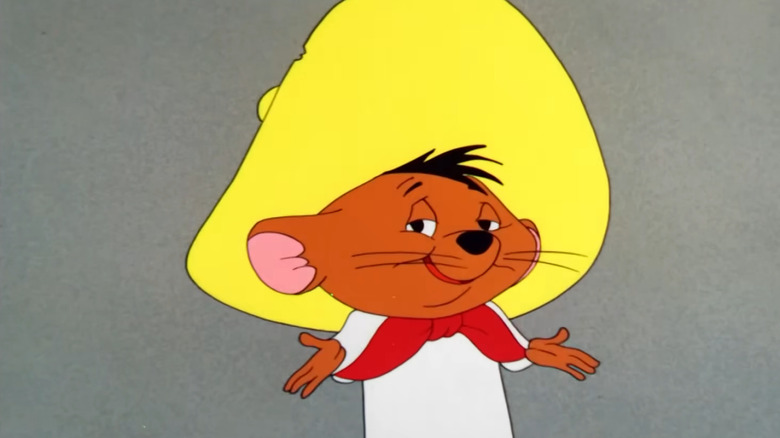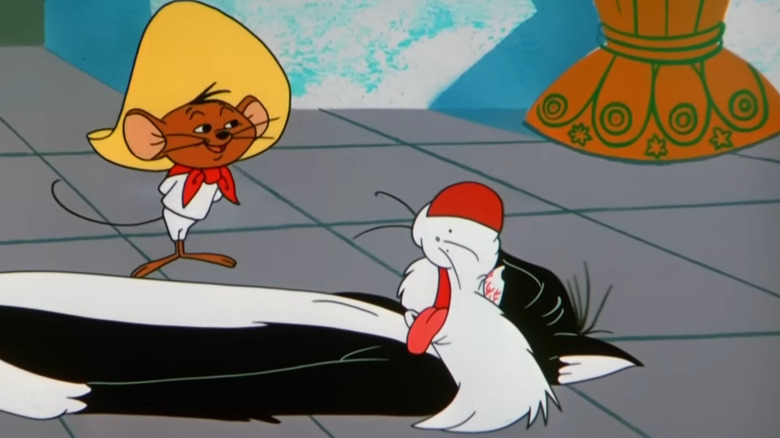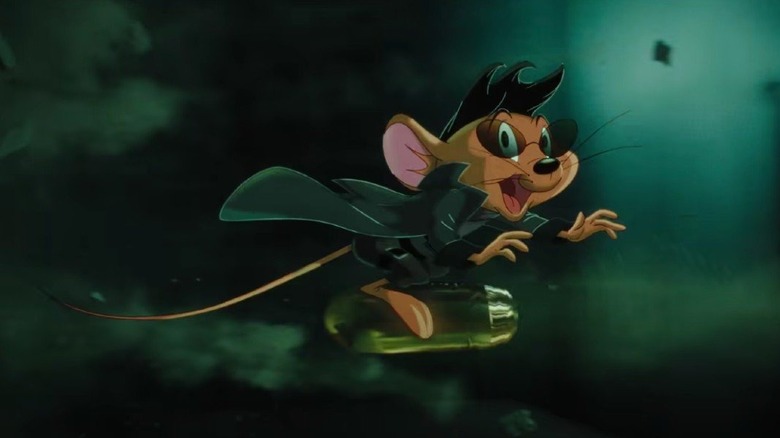Why Cancelling Speedy Gonzales Landed Cartoon Network In Some Heat
In 2021, in the months leading to the release of "Space Jam: A New Legacy," the New York Times published an editorial which said cartoon character Pepé Le Pew "normalized rape culture." In that same piece, the author also wrote that Speedy Gonzales had friends who "helped popularize the corrosive stereotype of the drunk and lethargic Mexicans."
In recent years, "Looney Tunes" stopped featuring rifles in new portrayals of Elmer Fudd, so why couldn't change its portrayal of Pepé Le Pew or Speedy, too? While France did nothing to defend Le Pew, Latinos in the U.S. and across Latin America jumped at the chance to defend Speedy Gonzales from never saying "Ándale! Ándale! Arriba! Arriba!" again. Comedian Gabriel Iglesias, who voiced Speedy in "Space Jam 2," defended the character on social media.
Few would argue that the character isn't racist or an outdated stereotype, but Speedy still engenders passionate love from various corners of the fanbase. Writer Moisés Chiullán tweeted that he loves the character, but not before opening up about being called Speedy Gonzales "by the all-white coaches and teammates on my Y[MCA] baseball team, with them adding 'ANDA-LAY ANDA-LAY!'"
Indeed, the character, who speaks with Spanish words sprinkled in his speech, is not very different from, say, Bumblebee Man in "The Simpsons." That character is a big successful star in the world of "The Simpsons," not unlike Krusty the Clown, and he also speaks by sprinkling Spanish words. And yet, Bumblebee Man does not elicit this kind of support — even if Bumblebee Man is directly inspired by a real Mexican hero and idol.
The beloved yet problematic history of Speedy Gonzales
This was not the first attempt at canceling or banning Speedy. In 1999, the character was briefly banned from Cartoon Network for reinforcing negative Mexican stereotypes, but the network reinstated him after fan outrage a couple of years later — outrage that included the League of United Latin American Citizens asking the network to release Speedy from his carcel (Spanish for "jail"). This led to a joke in "Looney Tunes: Back in Action" where Speedy and Porky Pig lament not being politically correct characters. No matter how much anyone tries, the world can't get rid of Speedy — he even almost got a solo movie a few years ago.
Still, despite the undeniable fan support, the problem with Speedy is that he is definitely a problematic character. The mouse was introduced in 1953's "Cat-Tails for Two," at a time when racial tensions surrounding Latinos, particularly people of Mexican descent, were particularly high in the U.S. In 1954, Operation Wetback was put into place by the government, which resulted in the deportation of over one million people of Mexican descent, including American citizens. It is hard not to see Speedy as part of this racist campaign against the idea of the "typical" Mexican — lazy, unable to speak proper English, and quick to evade authorities.
Speedy Gonzales remains popular among Latinos
Despite this, why is the character beloved over 60 years later? Because of the historically severe lack of Latino representation in American media, of course. Starving for representation, Latinos will turn any character into one of their own — like the way Goku became a Latino icon, with thousands of Juárez residents showing up for a public screening of the final episodes of "Dragon Ball Super." Even if Speedy is not a positive portrayal, it is still unequivocally Mexican, so Latinos embrace him. As The Huffington Post wrote during the 2021 Speedy controversy, even if the creators intended the character to exploit the audience's animosity toward foreigners, it backfired, and the world ended up laughing along with Speedy Gonzales' witty antics.
Likewise, Remezcla wrote at the time, "[Latinos] found and attached ourselves to the small pieces of us that we connected with. In turn, we created a Speedy Gonzales into our own hero." It doesn't matter what Speedy was when he was created, it matters what he is for Latinos everywhere now — a cunning, funny hero. No matter how many times they try to cancel Speedy, he and his millions of fans will simply grab our sombreros and say "Ándale! Ándale! Arriba! Arriba!"


